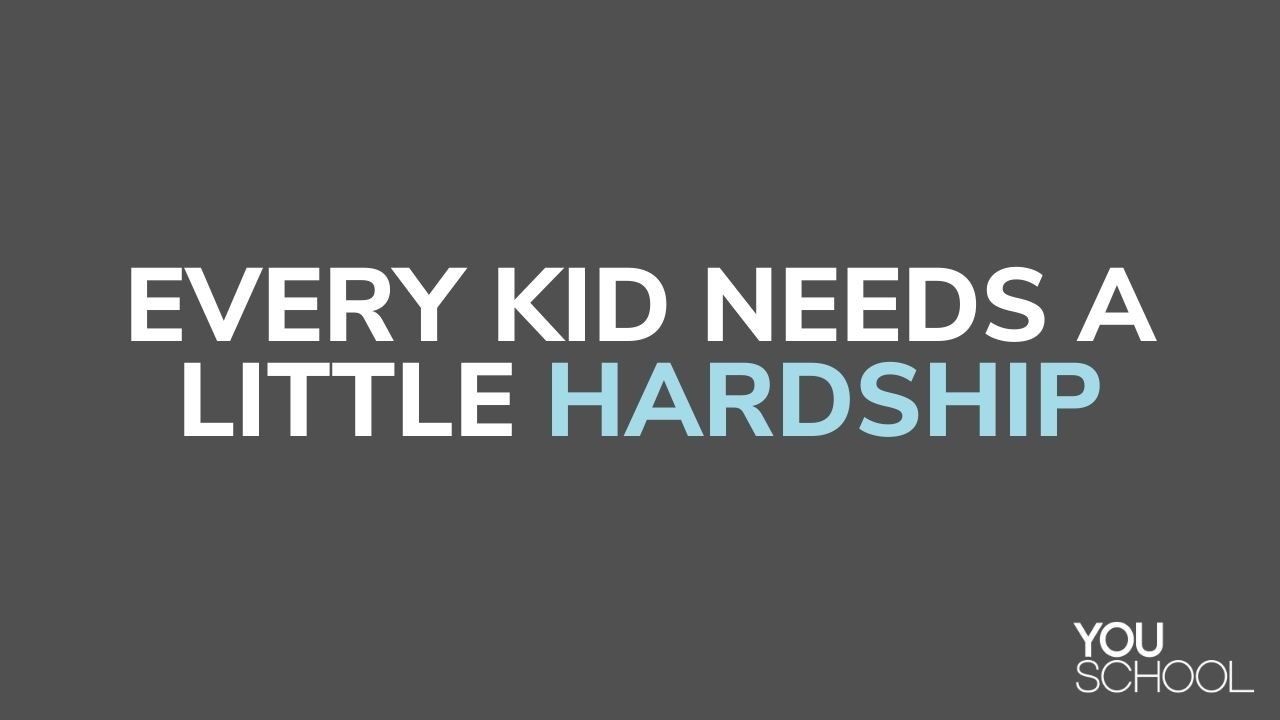Every Kid Needs a Little Hardship

One morning years ago, I was walking my daughter to school on a typical weekday. She had been struggling to get ready by herself on time for a few months, and it was a daily battle just to get her out the door so she could get to school on time. We had been giving her clear expectations and the resources she needed: we made a checklist for her, gave her an alarm clock, and made sure to get her into bed early—but she still seemingly refused to take responsibility to be on time. When we got to school that morning after another one of those difficult battles, right when the bell rang she remembered that she forgot to pack her binder inside her backpack and she panicked. Bringing her binder was the ONE requirement her teacher had given. If a student forgot their binder, they would lose the opportunity to attend 'Fun Friday', not to mention feel embarrassed.
She turned to me and said, "You forgot my binder; you have to go get it."
Now, I'm no monster. I don't want any of my kids to suffer needlessly, or at all for that matter. And, I have to admit, I was tempted to run back home and get it for her. I hated seeing the panic on her face, and I wanted her to be successful in school. (I also didn't want her teacher to assume that we were the types of parents who don't support her education.)
Heartless as it seemed and felt to my daughter, I calmly responded and said, "No, honey—you forgot your binder. It's your top job every morning, and we remind you every single day. The bell just rang, and you forgot it. You're going to have to go to your class and tell your teacher that you forgot it." She was furious. But I walked away.
Guess what? She never forgot her binder again.
One of the most tempting mistakes parents make, especially in more modern times, is to protect their kids from hardship. Of course, it makes sense—if you can protect your kids from hurt feelings, disappointment, failure, or rejection, shouldn't you? Wouldn't you?
It's not just consequences from forgetting things that kids need, though. They need opportunities to experience resistance that comes from life. Challenges, setbacks, and disappointments are ripe for critical life lessons. Those are the moments where their character gets structure.
What can parents do to make sure they don't rescue their kids and inadvertently harm them for their future? For one, they can share their own stories of grit and resilience. Think back to times in your own life when you had to dig deep and push through. Then, simply look for an opportunity to share your story. You don't need permission from them, just start sharing. "I was reminded the other day about a time in my life that was really difficult. Have I ever told you about..."
Also, parents can look for small victories throughout the day to point out the resilience their kids already have—evidence that your kid already has some element of grit underneath the surface. If you see them push through during a practice or a game, mention it. If you catch them pulling out their books after school to do homework without your prompting, notice it. Even if you see them watching a YouTube video about how to play Fortnite better, celebrate it. The more you point out and celebrate their drive to keep moving forward in small things, the more they'll see that as part of their identity. What gets celebrated gets repeated.
Finally, beware of the language you use when it comes to setbacks and resistance in your own life. Do you find yourself using victim language like blaming? Do you get overwhelmed and give up, saying, "it's not fair!"? Or, do you demonstrate quiet confidence, responding with determination and resolve? Taking a lesson from Stoicism, we can't control the circumstances in our lives, but we certainly work to choose a more productive response. What kids see in us gets repeated in their lives, too.
Life is hard, and no one escapes resistance. The most important parts of life are especially ripe with difficulty. But there's no guarantee that your kids will have the gumption they need to push through when the currents move against them. That's why it's so important to cultivate grit when they're young.
We have a podcast episode on resilience, too. Take a listen.
